42 how can proteins be denatured
Denaturation and Renaturation of Proteins | Nature DESPITE the considerable advances that have been made in our knowledge of protein structure, the problem of denaturation remains somewhat obscure. A general theory of the phenomenon has been ... Protein Denaturation Temperature and with Heat: What, How, Detailed Facts The protein denaturation temperature in onset in said to be 40 degrees C yet some may need about 37 to 38 for transition. All the cells in human body have proteins in them. The basic shape of protein is a chain composed of amino acids. We shall need protein to help get the cell in the body repaired and maintained along with making up of new ...
Why does protein not function after it has been denatured? Why is a denatured protein a problem? The denaturation of many proteins, such as egg white, is irreversible. A common consequence of denaturation is loss of biological activity (e.g., loss of the catalytic ability of an enzyme). When a solution of a protein is boiled, the protein frequently becomes insoluble—i.e., it is denatured—and...
How can proteins be denatured
What can denature a protein? Explained by FAQ Blog What are 5 ways to denature a protein? heat. irreversible, disrupts week interactions. mechanical agitation. irreversible, increases kinetic energy to disrupt weak interactions. extremes of pH. disrupts salt bridges. Ureal/Chaotropic agents. disrupt hydrogen bonds. nonpolar solvents. ... soaps and ... Western blot sample preparation | Abcam *Proteins that are found exclusively or predominantly in a sub-cellular location will be more enriched in a lysate of the sub-cellular fraction compared with whole cell or tissue lysates. This can be useful when trying to obtain a signal for a weakly-expressed protein. Please consult our separate protocols for sub-cellular fractionation. Protein Denaturation Process & Causes | What is Denaturation of a ... What Causes the Denaturation of Proteins. Proteins are denatured when bonds holding the secondary and tertiary structures together are disrupted by an external stress.
How can proteins be denatured. denaturation | Definition, Examples, & Facts | Britannica denaturation, in biology, process modifying the molecular structure of a protein. Denaturation involves the breaking of many of the weak linkages, or bonds (e.g., hydrogen bonds), within a protein molecule that are responsible for the highly ordered structure of the protein in its natural (native) state. Denatured proteins have a looser, more random structure; most are insoluble. Denaturation ... Learn About Renaturation Of Protein | Chegg.com For proteins, denaturation is allotted by the applying of associate in nursing external stress or compounds like a robust acid or base, a targeted inorganic salt and associate in nursing organic solvent, radiation, or heat. 1. Reconstruction of the denaturized supermolecule or macromolecule into the original kind is completed by the method of ... How do acids and bases denature a protein? | AAT Bioquest Answer. Acids and bases can significantly change the environmental pH of proteins, which disrupts the salt bridges and hydrogen bonding formed between the side chains, leading to denaturation. Increasing the pH by adding bases converts the pronated -NH3+ ion to a neutral -NH2 group?while decreasing the pH by adding acids converts the -COO- ion ... What is Protein Denaturation? - Naked Nutrition August 17, 2020. Once you ingest protein through your food, your body takes them apart and repurposes those amino acids to build anything it needs, from hormones to cells and tissues. This process of breaking down and reorganizing a protein's structure is what we call protein denaturation and can occur through a variety of processes. As ...
Denaturation of Proteins: Causes, Process - Collegedunia The process known as denaturation can easily change the structure of secondary, tertiary, and quaternary proteins. These modifications have the potential to be quite harmful. Denaturation can be caused by heat, acid or base exposure, or even violent physical action. Heat denatures the albumin protein in egg white, causing it to solidify into a ... What Does it Mean to Denature a Protein? - CulinaryLore When you cook a protein, you denature it in a similar way to how the HCL in your stomach does. In fact, professional chefs know that you can basically "cook" a protein by applying an acid to it. Most proteins, when they are heat-treated and denatured in this way, become more available to the body for digestion. protein - Protein denaturation | Britannica Proteins are denatured by treatment with alkaline or acid, oxidizing or reducing agents, and certain organic solvents. Interesting among denaturing agents are those that affect the secondary and tertiary structure without affecting the primary structure. The agents most frequently used for this purpose are urea and guanidinium chloride. Protein folding - Wikipedia A fully denatured protein lacks both tertiary and secondary structure, and exists as a so-called random coil. Under certain conditions some proteins can refold; however, in many cases, denaturation is irreversible.
Denaturation Protein - Elmhurst University Denaturation of proteins involves the disruption and possible destruction of both the secondary and tertiary structures. Since denaturation reactions are not strong enough to break the peptide bonds, the primary structure (sequence of amino acids) remains the same after a denaturation process. Denaturation disrupts the normal alpha-helix and ... Protein Denaturation - an overview | ScienceDirect Topics The secondary and tertiary structure of a protein can be disrupted by heating, by pH changes, by high concentrations of substances such as urea or by reducing agents that break the disulphide bonds. The process is called denaturation, and it destroys the protein's biological activity. Proteins - Michigan State University Not all proteins are easily denatured. As noted above, fibrous proteins such as keratins, collagens and elastins are robust, relatively insoluble, quaternary structured proteins that play important roles in the physical structure of organisms. Secondary structures such as the α-helix and β-sheet take on a dominant role in the architecture and ... Denaturation Of Proteins - Definition, Causes & Explanation with Videos Denaturation Of Proteins - Denaturation is a process in which proteins or nucleic acids lose the quaternary structure. Get information on proteins, denaturation of proteins, their stability, and what causes denaturation of proteins. learn more at BYJUS.
Denaturation of protein - Bioscience Notes When it is boiled, heat denatures the proteins and makes them lose solubility. Denatured proteins aggregate and form a mass that is now opaque and solid. Similarly, altering the pH of milk by adding acids such as citric acid from lemon juice denatures milk proteins and curdles the milk. The solid white portion that separates from the whey is denatured protein. This can also be seen when milk curdles naturally due to bacterial colonization. Bacteria can produce lactic acid as a byproduct of ...
How do detergents denature proteins? - Quora Answer (1 of 7): Detergent has a hydrophobic side and a hydrophilic side (When it dissolves grease, it forms protective bubbles from the water by surrounding grease molecules with the hydrophobic side). Proteins have hydrophobic and hydrophylic sides, the deregent is attracted to these and forces...
How can a protein become denatured? - Answers A protein may become denatured when exposed to intense heat or radiation. When a protein becomes denatured, its basic structure is damaged enough that it is no longer able to function. Is it...
Protein Denaturation Examples: Detailed Explanations A protein becomes denatured when its normal shape gets deformed because some of the hydrogen bonds are broken. Once a protein source reaches your stomach, hydrochloric acid and enzymes called proteases break it down into smaller chains of amino acids. Amino acids are joined together by peptides, which are broken by proteases.
Protein Denaturing Activity - Arizona State University proteins maintain their original shape. These proteins were not denatured. 2. Cooking (hot water). Whenever eggs are cooked with heat, the egg whites turn from clear to white, and the gel becomes more rubbery. As heat denatured the proteins in the egg white, it broke apart some of the bonds (mostly hydrogen bonds) that were holding
Protein Denaturation Process: Causes and Step by Step Facts Any protein is said to be denatured only if normal state gets deformed as some of the bonds that it holds being the hydrogen bond is broken down. There are many weak bonds that are likely to break in order to get this process initiated.
Transmembrane Protein - an overview | ScienceDirect Topics Some water-soluble proteins, under carefully defined conditions, can be denatured, including loss of function, and subsequently renatured with gain of function. Experimental observations of this kind of behavior led to the concept that these proteins in an aqueous environment were at or near their point of lowest overall free energy in their ...
How to Denature a Protein: 7 Steps (with Pictures) - wikiHow Denaturing a Protein 1. Heat is one of the easiest ways and most common ways to denature a protein. When the protein in question is present... 2. Apply alcohol. Alcohol disrupts the hydrogen bonds that occur between amide groups of a peptide bond. 3. Change the pH. The internal structure of a ...
What is denaturation and how can proteins be denatured? - Answers Protein denaturation is by rendering the protein rancid. This process is by oxidation or by excessive heat. Denatured proteins are unhealthy to the body. Why sds denaturation is used in the sds...
Enzymes (Updated) - YouTube The Amoeba Sisters explain enzymes and how they interact with their substrates. Vocabulary covered includes active site, induced fit, coenzyme, and cofactor....
How can a protein structure be denatured? - Quora Anything that disrupts the protein structure can cause denaturation. So the easiest way to denature a protein is to heat it. Egg white albumen is clear and water soluble but if you put the egg into a hot frying pan, the proteins denature and you get a white solid, the fried egg white.
Denaturation of Proteins and Its Causes - VEDANTU Denaturation of protein is a process that breaks down the strong links or bonds that make up the protein molecules. Protein molecules in their native or natural form have strong bonds and a highly ordered and stable structure. After denaturation of the protein molecule, the links or bonds weaken, and the molecule takes a more loose or random structure, most of them being insoluble.
Protein Denaturation Process & Causes | What is Denaturation of a ... What Causes the Denaturation of Proteins. Proteins are denatured when bonds holding the secondary and tertiary structures together are disrupted by an external stress.
Western blot sample preparation | Abcam *Proteins that are found exclusively or predominantly in a sub-cellular location will be more enriched in a lysate of the sub-cellular fraction compared with whole cell or tissue lysates. This can be useful when trying to obtain a signal for a weakly-expressed protein. Please consult our separate protocols for sub-cellular fractionation.
What can denature a protein? Explained by FAQ Blog What are 5 ways to denature a protein? heat. irreversible, disrupts week interactions. mechanical agitation. irreversible, increases kinetic energy to disrupt weak interactions. extremes of pH. disrupts salt bridges. Ureal/Chaotropic agents. disrupt hydrogen bonds. nonpolar solvents. ... soaps and ...

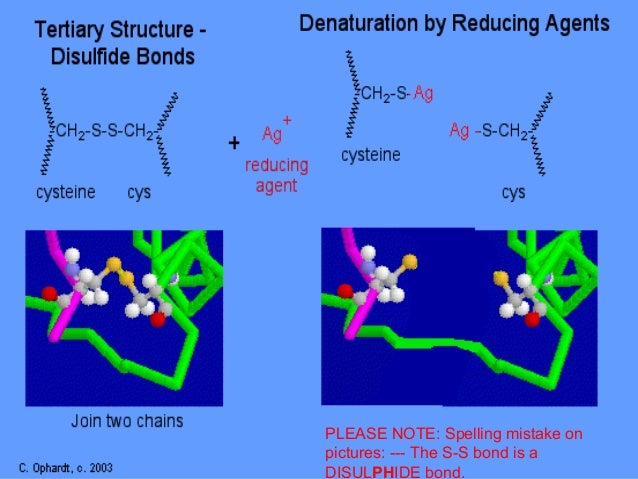
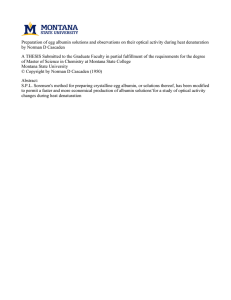
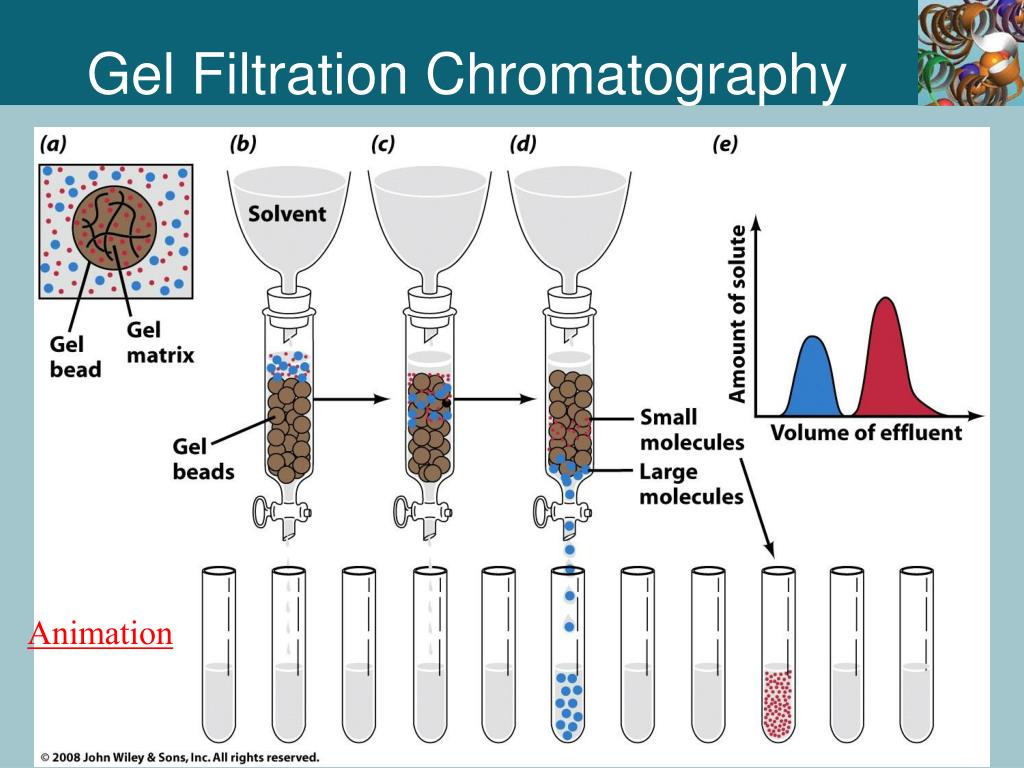
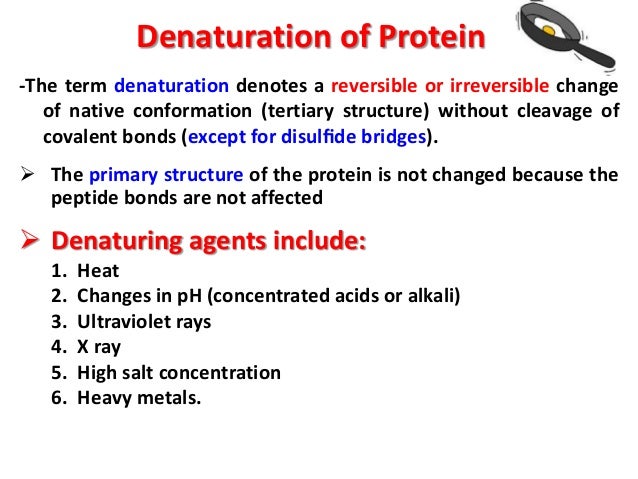



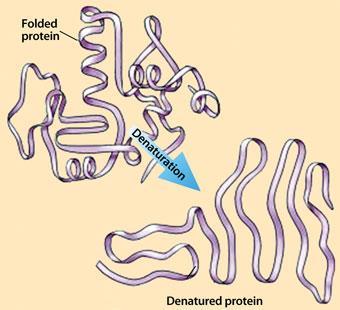
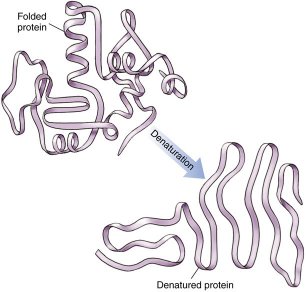

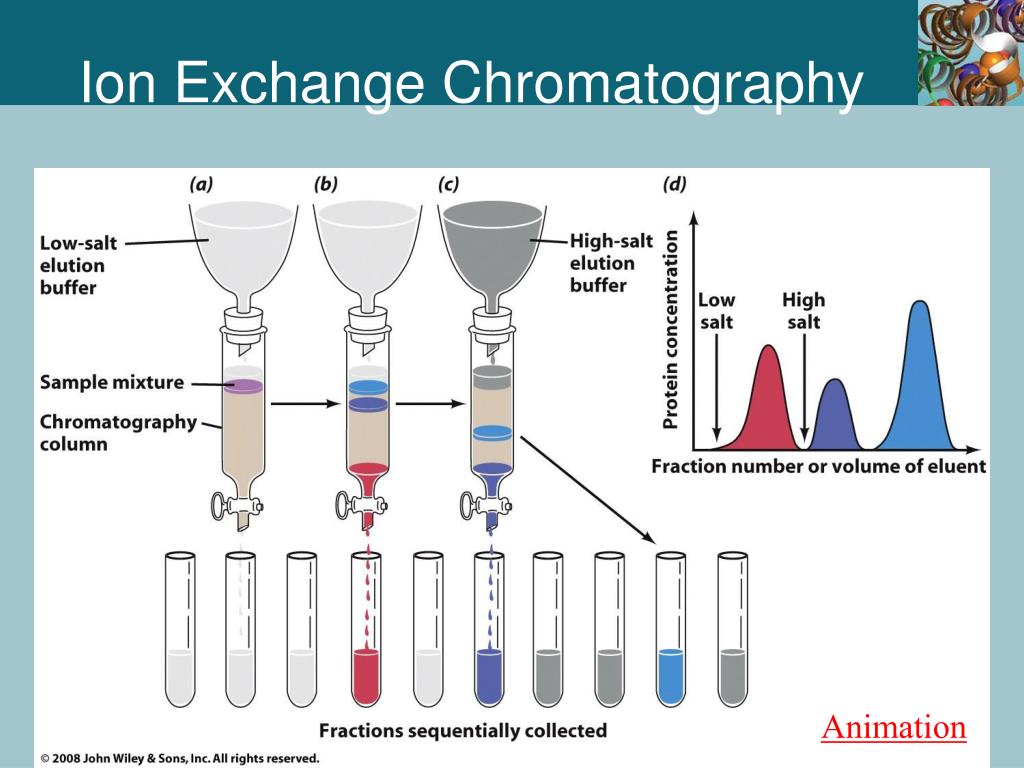
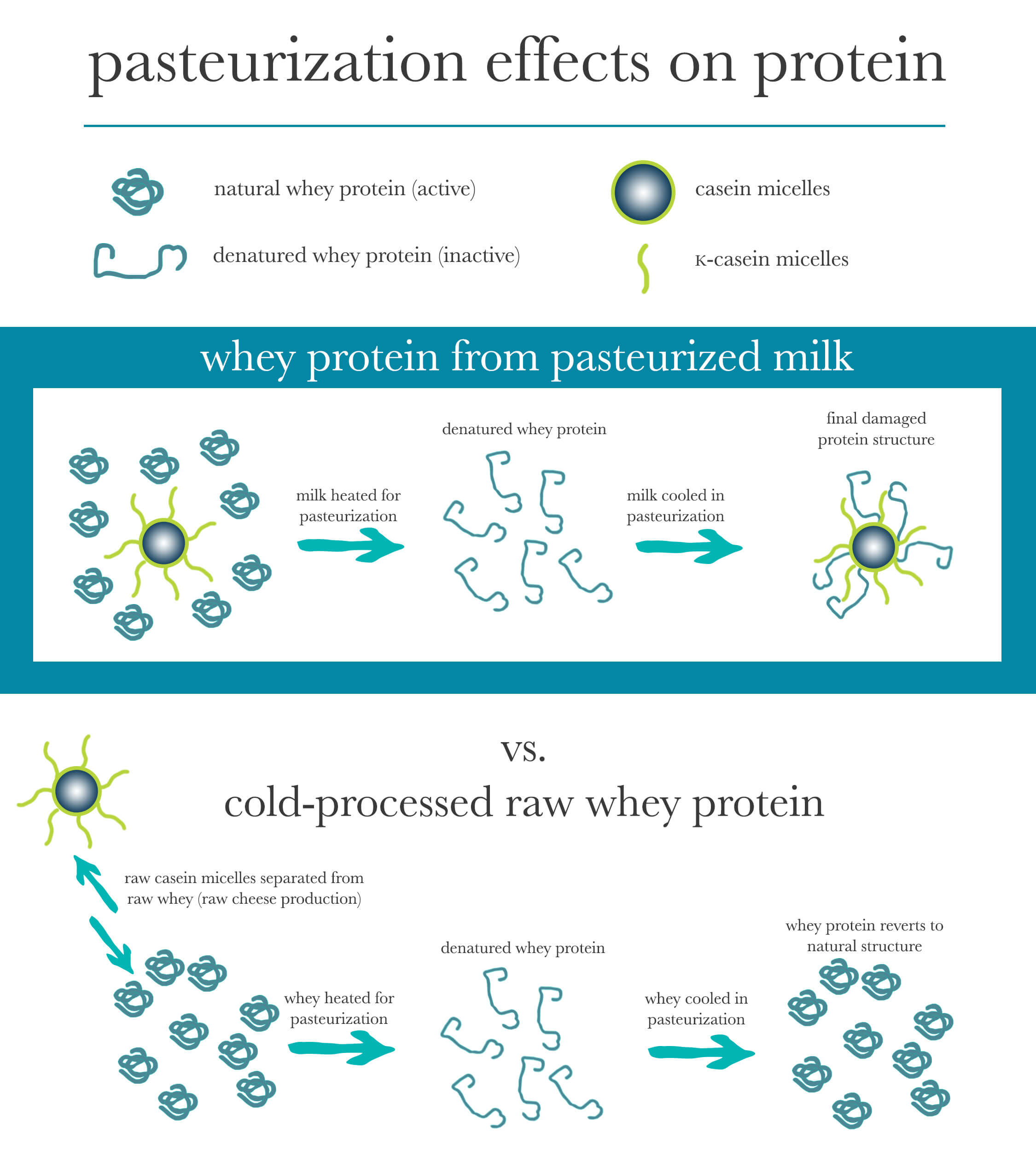
0 Response to "42 how can proteins be denatured"
Post a Comment